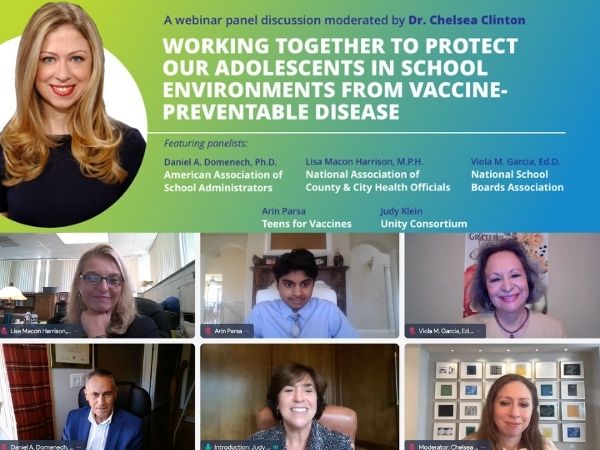
Webinar: Working Together to Protect Our Adolescents in School Environments from Vaccine-Preventable Diseases
September 30 2021: Dr. Chelsea Clinton moderated a panel discussion among distinguished leaders from the American Association of School Administrators (AASA), the National School Boards Association (NSBA) and the National Association of County and City Health Officials (NACCHO) on promising practices that schools have adopted to help keep students safe and healthy and support healthy school environments. Arin Parsa from Teens for Vaccines was invited on the panel for his inputs as a high school student. Panelists:
· Daniel A. Domenech, Ph.D., American Association of School Administrators (AASA)
· Viola M. Garcia, Ed.D., National School Boards Association (NSBA)
· Lisa Macon Harrison, M.P.H. National Association of County and City Health Officials (NACCHO)
· Arin Parsa, Founder of Teens for Vaccines, Unity Teen Advisor, 9th Grade High School Student
Click here for the webinar recording.
Excerpts from Arin Parsa's responses:
Q1) What strategies are teens likely to embrace and practice, and what support do they need from parents, schools, and healthcare providers?
[Arin] We teens want to be heard and be a part of the conversation.
Teens will embrace strategies like getting vaccinated and wearing a mask when they are involved in the decision-making. Here are some concrete ways to really engage and support us teens:
- Firstly, in schools and communities, creating spaces for us teens to talk to teachers, nurses, and doctors can go really a long way. And in these spaces, asking us teens on how safe we are feeling, answering our questions about vaccines and masks, and most importantly brainstorming solutions with us teens for keeping us all safe from COVID can really help.
- Because when teens are part of the decision-making, they will not only embrace the decisions, but will go out there and educate their own peers
- Teens really listen to each other :-), so allowing students to use after school club settings where students can organize teen panels, share best practices like getting vaccinated and wearing masks to protect others can really help. Peer2peer education can truly work wonders.
- And finally, we teens do really well when our parents are supporting and cheering for us. So, parents taking their teens to a doctor when they have questions, celebrating getting vaccinated, telling their teen that they are really proud of their teen for wearing a mask and caring for others… are ways parents can be supportive.
In a nutshell...to summarize...asking us teens what we are thinking, how we are feeling, what are our ideas for ending the pandemic, and celebrating our contributions are the most effective ways to engage us teens in the fight for “crushing COVID.”
Q2) What are simple, effective messages to communicate the benefits and risks to teens of COVID-19 vaccination vs. the risks of getting or spreading COVID-19 disease?
[Arin] At this point in the pandemic, the main message to communicate to teens is that we are in the middle of a huge surge. The Delta variant is highly contagious. COVID can be deadly to us teens and we can pass this terrible virus to our friends and to our little brothers and sisters who don’t yet have a vaccine for themselves. So, getting vaccinated is the best way that teens can protect themselves and their loved ones. Teens can be the superheroes we need for crushing COVID and getting our lives back.
It is also important to reassure teens that COVID vaccines are indeed safe and effective. Nearly 6 billion vaccines have been administered worldwide. There is incredible evidence that vaccines are safe.
Finally, if I may add, personal stories are very powerful motivators for teens. So, these messages to teens must come from other teens who are vaccinated, are masking up, and are looking forward to getting their lives back once we all “Crush COVID.” Ultimately, hearing from your own vaccinated peers can be really effective for us teens.
Q3) How can schools encourage agency for their adolescents to get vaccinated against routinely recommended and COVID-19 vaccines? (Arin)
Thank you so much for this question. So much to say on this topic.
School communications on vaccines are often directed to parents and not to us teens. I feel like this is a huge missed opportunity to raise vaccine awareness in teens. Also, teens don’t have easy access to vaccines. When parents are busy or are working two jobs and teens don’t have transportation, they aren’t able to up with their doctor visits-- so school-based health clinics can really create agency for teens to get their routine and COVID vaccines.
We teens really trust our teachers, school nurses, and doctors a lot. We need spaces in schools where students can learn about how vaccines save lives, which vaccines we teens need and when, and how we all have a greater responsibility to our communities by getting vaccinated to protect each other. No one should get sick, live in fear, or die from vaccine-preventable diseases. I also firmly believe that education is the best antidote to misinformation. Teens today are learning about vaccines from social media and that has to change. Schools can really empower teens to be champions of public health.
Schools have made a tremendous difference in student mental health and nutrition holistically, and now with the post COVID era dawning on us--(so as I said before) schools must use this moment to empower us teens with vaccine education as well as easy access to all vaccines in school clinics-- These are two powerful ways to create agency for us teens to be vaccinated and to be champions of public health. Thank you!
Click here for the webinar recording.